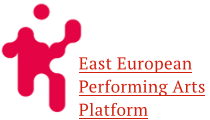East European Performing Arts Platform (EEPAP) supports the
development of contemporary performing arts (dance and theatre)
in 18 countries of Central and Eastern Europe.
Confrontations: Sessions in East European Art History (Research Project): Call for participants
CALL FOR PARTICIPANTS
Confrontations: Sessions in East European Art History
The Post-socialist Art Centre (PACT) at the Institute of Advanced Studies UCL, with support from the Getty Foundation’s Connect ing Art Histories initiative, is launching a new research project entitled Confrontations: Sessions in East European Art History. Early and mid-career scholars are encouraged to apply to participate in four meetings to be held in Ljubljana/Zagreb, Prague/Bratislava, London/Paris and Warsaw/Łódź over 2019-20.
Led by Dr Maja Fowkes and Dr Reuben Fowkes, the project investigates the entangled histories of East European art through a series of itinerant symposia held at pertinent locations across and beyond the region. By staging encounters between contrasting aesthetic and critical positions and creating conditions for comparative insights to crystallise, these sessions aim to instigate more rigorous and integrated accounts of East European art history. Acknowledging the singularity of individual practices, the multi-directional flow of artistic exchange and the generative effects of local circumstances, this transnational initiative is a contribution to an emergent globalhistory of art from the Second World War till today.
The title of the project refers to the series of Confrontations exhibitions held in Czechoslovakia in the years around 1960 and again in the spirit of post-modernist revival during the mid-1980s. While the original studio exhibitions were a means for young artists to challenge the dominance of socialist realism and figurative art by embracing the international style of art informel, those held at the end of the socialist period were organised in aesthetic opposition to the ethos of the dissident neo-avant-garde. What these two moments of contestation had in common was a willingness to challenge established artistic paradigms, a critical attitude to dominant institutions and a boldly experimental character. They also correspond chronologically to the two art historical periods with which this research project is primarily concerned.
Each of the four sessions is conceived as a week-long gathering with a core group of participants who will engage in seminar discussions, give presentations of their research, as well as take part in a programme of visits to relevant sites such as museums, galleries, artist studios or specialist archives. The topics of each meeting will be devised to draw on the strengths of local collections and points of primary art historical interest in the specific cities in which they are held. Each participant is expected to actively participate in discussions and give two research papers over the course of the project.Travel and accommodation expenses will be covered. Participants must commit to attending all four meetings for the full duration.
Applications are particularly sought from post-doctoral researchers and early career scholars from the countries of Central and Eastern Europe inclusive of the Baltic States and the Balkans, as well as from those who study the art history of the region from further afield. While researchers specialised in any aspect of post-war East European art history are encouraged to apply, we are keen to recruitparticipants with an interest in engaging with under-researched topics including socialist realism, art informel, neo-constructivism and pop art, as well as the post-avant-garde, post-modern and alternative art currents of the 1980s.
To apply, please submit a single word or pdf document with:
1) Your name, email address, institutional affiliation, and postal address.
2) An applicant statement (approximately two pages)
This should state what you would bring to the programme, the nature of your current work and involvement with East European art history, and what you believe you could gain through your participation in the Confrontations project.
3) A short CV
This should consist of a two-page CV, including a selection of your most relevant publications or research projects.
For enquiries, please contact Maja Fowkes or Reuben Fowkes by email [email protected]
Please email the documents specified above as a single document to [email protected] by Friday9 November 2018.
Selection of the participants will be made based on the recommendations of the project team comprising Dr Maja Fowkes (PACT UCL), Dr Reuben Fowkes (PACT UCL), Dr Pavlina Morganová (Academy of Fine Arts in Prague), Dr Tomasz Załuski (Institute of Contemporary Culture, University of Łódź) and Alina Șerban (art historian and curator, Bucharest).
The organisers aim to notify applicants of the outcomes by the end of November.
More information here: http://www.translocal.org/confrontations/opencall.html
